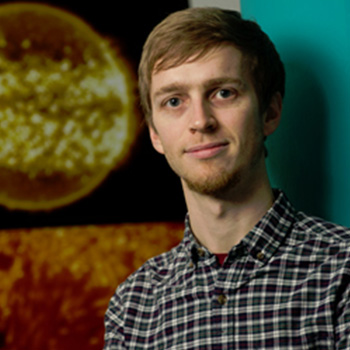Richard Morton
Scientist & Senior Lecturer
Department: Mathematics, Physics and Electrical Engineering
Northumbria University, Newcastle, UK
Career Profile:
Born in Macclesfield, UK, Richard Morton obtained his Ph. D from the University of Sheffield in Applied Mathematics/Solar Physics in 2011. Thereafter he continued to work at Sheffield as a research scientist until in 2012, he was appointed as Anniversary Research Fellow in the Department of Mathematics, Physics and Electrical Engineering at Northumbria University in Newcastle, UK. In June 2014, he was awarded a Leverhulme Trust Early Career Fellowship to continue with his research. He has been working at the ground-based solar observatories to study wave phenomena in the solar atmosphere and the Royal Astronomical Society recognized his contributions with the Winston Capital Award. He currently serves as Deputy Chair on the UK Solar Physics Council, leads Northumbria’s efforts in the UK DKIST consortium and serves on the time allocation committee for UK-funded observing at the Swedish Solar Telescope.
He is also UK STEM ambassador. He has experience in Public Engagement across many formats (e.g., schools, science fairs, online articles) and has been working closely with experts in Pedagogy over the last 5 years to develop solar physics-based outreach programmes (Imagining the Sun).
Richard’s current research focus is on understanding how energy is transferred through the Sun’s atmosphere by Alfvénic waves. He is predominantly a data analyst, working with observations from imaging-spectropolarimeters, namely the Coronal Multi-Channel Polarimeter and the Swedish Solar Telescope; as well as using NASAs Solar Dynamic Observatory.
Areas of expertise:
Magnetohydrodynamic waves, corona, chromosphere
Areas of interests:
Methodology of data science, statistics and machine learning
Role in SOLARNET:
He will lead the outreach effort in the SOLARNET project.
Life Outside of Science:
He speaks English and outside of science enjoys being a father, playing football and amateur astronomy.
A Dose of Motivation:
After spending the last few years resisting learning Python and increasingly swimming against the tide, Richard is now a Python advocate and believes there is no better time to learn! He recommends: Python Data Science Handbook by Jake VanderPlas for young researchers to get started with.
(https://jakevdp.github.io/PythonDataScienceHandbook/index.html)

